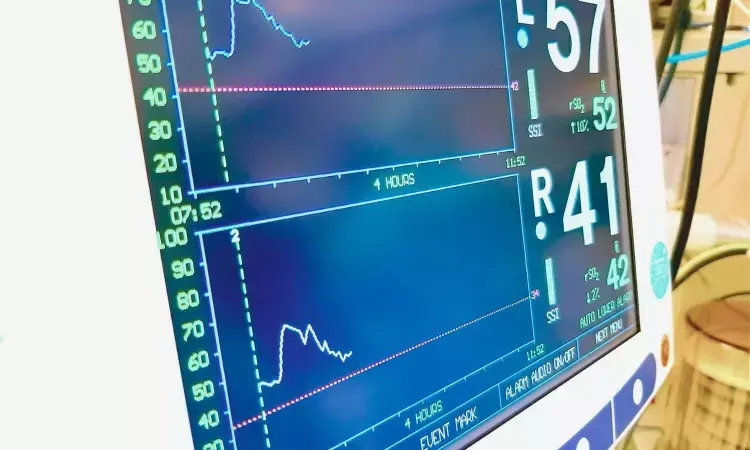- Home
- Medical news & Guidelines
- Anesthesiology
- Cardiology and CTVS
- Critical Care
- Dentistry
- Dermatology
- Diabetes and Endocrinology
- ENT
- Gastroenterology
- Medicine
- Nephrology
- Neurology
- Obstretics-Gynaecology
- Oncology
- Ophthalmology
- Orthopaedics
- Pediatrics-Neonatology
- Psychiatry
- Pulmonology
- Radiology
- Surgery
- Urology
- Laboratory Medicine
- Diet
- Nursing
- Paramedical
- Physiotherapy
- Health news
- Fact Check
- Bone Health Fact Check
- Brain Health Fact Check
- Cancer Related Fact Check
- Child Care Fact Check
- Dental and oral health fact check
- Diabetes and metabolic health fact check
- Diet and Nutrition Fact Check
- Eye and ENT Care Fact Check
- Fitness fact check
- Gut health fact check
- Heart health fact check
- Kidney health fact check
- Medical education fact check
- Men's health fact check
- Respiratory fact check
- Skin and hair care fact check
- Vaccine and Immunization fact check
- Women's health fact check
- AYUSH
- State News
- Andaman and Nicobar Islands
- Andhra Pradesh
- Arunachal Pradesh
- Assam
- Bihar
- Chandigarh
- Chattisgarh
- Dadra and Nagar Haveli
- Daman and Diu
- Delhi
- Goa
- Gujarat
- Haryana
- Himachal Pradesh
- Jammu & Kashmir
- Jharkhand
- Karnataka
- Kerala
- Ladakh
- Lakshadweep
- Madhya Pradesh
- Maharashtra
- Manipur
- Meghalaya
- Mizoram
- Nagaland
- Odisha
- Puducherry
- Punjab
- Rajasthan
- Sikkim
- Tamil Nadu
- Telangana
- Tripura
- Uttar Pradesh
- Uttrakhand
- West Bengal
- Medical Education
- Industry
Even short bouts of hypothermic circulatory arrest tied to cognitive deficits after aortic arch surgery

USA: Even short bouts of hypothermic circulatory arrest (HCA) during aortic arch surgery were associated with neuroimaging and neurocognitive deficits after surgery irrespective of the hypothermia level applied, a GOT ICE substudy has revealed.
"Findings contradict longstanding surgical dogma that hypothermic circulatory arrest durations under 25-30 minutes are safe with regards to brain injury," the researchers reported.
They found that patients who underwent surgery with less than 20 minutes of HCA and adjunctive antegrade cerebral perfusion (ACP) demonstrated an approximately 40% incidence of dichotomous cognitive deficit four weeks post-surgery. Also, there was a nonsignificant trend toward increased frequency with people assigned to warmer HCA temperatures:
- High-moderate hypothermia (24.1-28.0 °C): 42.9%
- Low-moderate hypothermia (20.1-24.0 °C): 41.8%
- Deep hypothermia (≤20.0 °C): 37.3%
Hypothermic circulatory arrest is a surgical technique that protects the brain during surgeries such as aortic arch repair, removing venous tumours, and operations on arteriovenous malformations in the head or neck. The technique takes body temperature down very low and stops blood circulation.
The safe duration of HCA has been debatable, some data suggests 25-30 minutes to be safe at deep hypothermia. Based on clinical safety data, aortic surgery centres worldwide have also shifted toward lesser hypothermia paired with ACP, an adjunctive technique for brain protection.
Recently, the GOT ICE trial showed low-moderate cooling to be noninferior to deep hypothermia concerning a composite global cognitive change score between baseline and 4 weeks postoperatively, though structured verbal memory was better preserved in the deep group. In the trial, there was no significant difference between deep cooling and high-moderate temperature groups, either, with ACP in the picture.
The GOT ICE substudy, presented by G. Chad Hughes, MD, of Duke University Medical Center in Durham, North Carolina, at the Society of Thoracic Surgeons (STS) annual conference, included 170 out of 282 participants who had HCA last under 20 minutes. The average age was 61 years, with under 20% women.
Key findings:
- There was a fairly balanced patient demographic and clinical characteristic at baseline across the three randomly assigned temperature groups, except for a higher prevalence of diabetes in the deep cooling group and more previous cardiac surgery in the low-moderate group.
- Due to the limited HCA time in these patients, surgeries were limited to hemi-arch repair instead of total arch repair.
- The trial defined dichotomous cognitive deficit as a greater than 1 standard deviation decline from baseline in at least one of the five cognitive domains: executive functioning, memory, processing speed, attention and concentration, and psychomotor skills.
- In a subset of patients from Duke (n=43), neuroimaging with high-resolution anatomical and resting state functional MRI identified an area of the frontal lobes -- the right anterior superior frontal gyrus region -- as particularly susceptible to the effects of even short HCA in the range of 8-17 minutes.
According to Hughes, the study suggests the possibility that longer HCA duration preferentially affects this brain region known to be functionally connected with the brain's default mode network, but does not prove causality.
Reference:
Society of Thoracic Surgeons. Hughes GC, et al "Frequency of neurocognitive deficits with even short (<20 minutes) durations of hypothermic circulatory arrest (HCA): debunking the myth of a 'safe' duration of HCA" STS 2024.
Dr Kamal Kant Kohli-MBBS, DTCD- a chest specialist with more than 30 years of practice and a flair for writing clinical articles, Dr Kamal Kant Kohli joined Medical Dialogues as a Chief Editor of Medical News. Besides writing articles, as an editor, he proofreads and verifies all the medical content published on Medical Dialogues including those coming from journals, studies,medical conferences,guidelines etc. Email: drkohli@medicaldialogues.in. Contact no. 011-43720751


